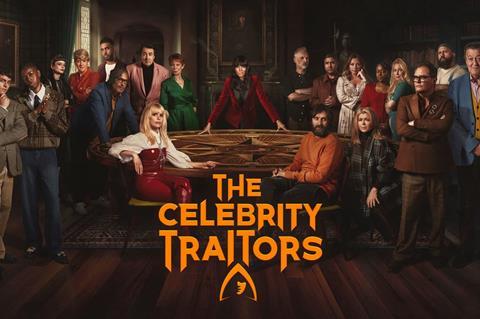From Alan Carr’s nervous sweating to contestants’ genuine tears, The Celebrity Traitors shows how mistrust corrodes relationships and harms body, mind and soul. But it also reveals our soul-deep longing for authentic connection - which only God can provide in its fullness, says Emma Hide

When The Traitors first aired in 2022, it gripped the nation with its potent mix of strategy, deception and raw emotion. Now, The Celebrity Traitors is proving just as addictive — with the BBC reporting that the début became its biggest unscripted TV launch since 2022.
By now, we all know the premise: 19 contestants enter the game. Three become secret ‘traitors’ while the rest remain ‘faithfuls’. The traitors ‘murder’ the faithful by night, while the faithful try to expose the traitors by day. At its heart lies one timeless question: who can be trusted?
This high-stakes version of the party game Mafia has turned viewers (myself included) into armchair psychologists, analysing every twitch and slip up. Beneath the drama is a fascinating exploration of what happens to human relationships when trust is stretched to breaking point.
A mirror to the soul
What’s striking about The Traitors is how real it feels to contestants. Tears, outbursts, sleepless nights, and the joy of unmasking a traitor are commonplace in the castle.
Even in The Celebrity Traitors - with little personally at stake - emotions run high: Comedian Alan Carr’s nervous sweating, actor Celia Imrie’s anxious flatulence, and rugby player Joe Marler’s thunderous glare at the roundtable all spring to mind.
Wherever it appears, deceit corrodes relationships, weakens communities and harms body, mind and soul
But why? After all, it’s just a game. Yet our brains struggle to tell the difference between real and imagined threats. That’s why merely thinking or dreaming about danger can quicken the pulse or unsettle the stomach.
The show’s setting heightens this effect. Unlike Mafia, which lasts an hour in our imagination, The Traitors unfolds over weeks of isolation in a real Scottish castle, with secret turret ‘murders’ and candlelit banishments that blur play and reality.
Contestants’ bodies and minds react as if the danger were real, and The Traitors becomes a psychological study in how mistrust shapes people and relationships.
The cost of deception
As Christians, we know we’re created for honest, loving relationships with God, others and ourselves. And, in Genesis 3, the serpent shows us how deception damages the human soul and fractures these relationships.
The Celebrity Traitors vividly illustrates these truths (along with other intriguing psychological dynamics). The toll of deceit is visible in every episode. Carr’s comic sweating and giggling soon give way to deflective humour, pacing and slip-ups. Singer-songwriter Cat Burns becomes increasingly withdrawn, fatigued and riddled with guilt. TV presenter Jonathan Ross later admitted: “I found the lying really wearing, it left me feeling increasingly uncomfortable.”
The faithfuls carry the pain and fear of betrayal. Actor Mark Bonner said his banishment “felt personal.” Paloma Faith was genuinely surprised and disappointed when betrayed by her close friend, Carr.
When faithfuls mistakenly eliminate one of their own, the group experiences shame and regret - marked by head-shaking, face-palming and frustration. Over time, suspicion warps behaviour: logic falters, emotions flare, and people begin to doubt themselves. As judgement weakens, contestants unintentionally turn on one another.
Existing friendships make things murkier, as trust rests more on familiarity than evidence. This has made traitors harder to detect; few believed Carr would betray his friend, and Ross’s talk show connections likely prolonged his survival.
Living in an atmosphere of mistrust damages body, mind and soul - for both the deceivers and those deceived. No wonder the TV show provides on set psychological support! It’s a powerful reminder that we’re designed for honest, trusting relationships — and living counter to this comes at a cost.
Eternal truths
So, what does this have to do with real life? Quite a lot.
Mistrust isn’t confined to reality TV. The Electoral Commission reports that only 14 per cent of the UK trusts politicians, and just 25 per cent trust major institutions, including the NHS, Metropolitan Police, Bank of England, Armed Forces - and even the Church.
Fake news, social media and advertising can distort truth and sow unhelpful seeds. Family breakdown, infidelity and abuse can all leave deep scars. It’s understandable that trust feels fragile in our society. Wherever it appears — in castles, congregations, workplaces, or homes — deceit corrodes relationships, weakens communities and harms body, mind and soul.
As Christians, we know we’re created for honest, loving relationships with God, others and ourselves
Yet The Celebrity Traitors also shows that trust, though fragile, can be restored. Faithfuls are often quick to forgive unmasked traitors, and lasting bonds are formed even amid the tension. The show may dramatise deceit, but it also reveals a soul-deep longing: to be known, trusted and loved without pretence.
Jesus, “the way, and the truth, and the life” (John 14:6) meets that longing. In a world riddled with deceit, Jesus offers something radically different: unconditional, truthful love that never betrays. As the Bible says in John 8:31–32, when we abide in the Word — both scripture and in Jesus himself — we discover real freedom from deception.
As his followers, we’re called to share this life-changing hope and reconciliation. Its exactly what our world is crying out for.






































No comments yet